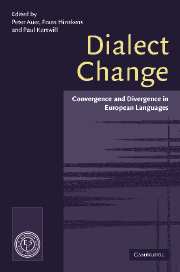Book contents
- Frontmatter
- Contents
- List of maps
- List of figures
- List of contributors
- Preface
- Map
- 1 The study of dialect convergence and divergence: conceptual and methodological considerations
- Part 1 Convergence, Divergence and Linguistic Structure
- Part 2 Macrosociolinguistic Motivations of Convergence and Divergence
- Part 3 Microsociolinguistic Motivations
- References
- Index
1 - The study of dialect convergence and divergence: conceptual and methodological considerations
Published online by Cambridge University Press: 22 September 2009
- Frontmatter
- Contents
- List of maps
- List of figures
- List of contributors
- Preface
- Map
- 1 The study of dialect convergence and divergence: conceptual and methodological considerations
- Part 1 Convergence, Divergence and Linguistic Structure
- Part 2 Macrosociolinguistic Motivations of Convergence and Divergence
- Part 3 Microsociolinguistic Motivations
- References
- Index
Summary
Introduction
Dialect change can have several different manifestations. Among these, dialect convergence (dc) and dialect divergence (dd) noticeably affect the relationships between related dialects. Dc and dd have probably been present for as long as dialects have existed. Various historical developments, including the ‘modernisation’ of society, have left their mark on the very nature of dialects and have partly changed the dynamics of dc and dd; moreover, they have broadened them to dialect – standard language convergence.
This chapter sets the stage for the various aspects of the study of dc and dd presented in this book, in that it both provides a general introduction and constitutes a springboard for the discussion of the themes and approaches which play a role in the individual chapters. As an introduction, the chapter presents the central terminology (section 2), provides the background information necessary for the interested non-specialist (section 3), sketches what we see as the main research methods (section 4), and binds together the issues featured in the various chapters (section 5).
Definitions of the Key Concepts
We will use the notion of ‘dialect’ to refer to a language variety which is used in a geographically limited part of a language area in which it is ‘roofed’ by a structurally related standard variety; a dialect typically displays structural peculiarities in several language components (cf. Chambers and Trudgill 1998: 5), though some of the authors in this book deal mainly with phonetic (or ‘accent’) features.
- Type
- Chapter
- Information
- Dialect ChangeConvergence and Divergence in European Languages, pp. 1 - 48Publisher: Cambridge University PressPrint publication year: 2005
- 32
- Cited by



